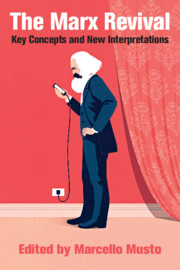Book contents
- The Marx Revival
- The Marx Revival
- Copyright page
- Contents
- About the Editor
- Contributors
- Preface
- Acknowledgements
- Note on the Text
- 1 Capitalism
- 2 Communism
- 3 Democracy
- 4 Proletariat
- 5 Class Struggle
- 6 Political Organization
- 7 Revolution
- 8 Work
- 9 Capital and Temporality
- 10 Ecology
- 11 Gender Equality
- 12 Nationalism and Ethnicity
- 13 Migration
- 14 Colonialism
- 15 State
- 16 Globalization
- 17 War and International Relations
- 18 Religion
- 19 Education
- 20 Art
- 21 Technology and Science
- 22 Marxisms
- Index
- References
13 - Migration
Published online by Cambridge University Press: 29 May 2020
- The Marx Revival
- The Marx Revival
- Copyright page
- Contents
- About the Editor
- Contributors
- Preface
- Acknowledgements
- Note on the Text
- 1 Capitalism
- 2 Communism
- 3 Democracy
- 4 Proletariat
- 5 Class Struggle
- 6 Political Organization
- 7 Revolution
- 8 Work
- 9 Capital and Temporality
- 10 Ecology
- 11 Gender Equality
- 12 Nationalism and Ethnicity
- 13 Migration
- 14 Colonialism
- 15 State
- 16 Globalization
- 17 War and International Relations
- 18 Religion
- 19 Education
- 20 Art
- 21 Technology and Science
- 22 Marxisms
- Index
- References
Summary
On the question of migration – and it was not the only one – Friedrich Engels got there before Karl Marx. In The Condition of the Working Class in England he dealt widely with the Irish immigration in Britain (over one million by 1845). He presented it there as an essential reserve of labour power for the take-off of British industry and the permanent existence of a ‘surplus population’ of unemployed workers. Borrowing from Thomas Carlyle (1795–1881) a frankly ethnicist characterization of Irish immigrants (‘but little above the savage’), Engels highlighted the downward moral and material spiral of competition into which they forced English workers. At the same time, however, as Eric Hobsbawm (1917–2012) noted, he described the political radicalization that developed in the Irish immigration, as well as the ardour and generosity that the Irish brought to the ‘cold, rational’ English workers through the mixing of temperaments and ‘races’. Engels thus also anticipated the key theoretical issue of the industrial reserve army, which Marx would later expound in Capital, and the key political issue of the relationship between Irish and English workers (or, more generally, between immigrant and indigenous workers), which would confront the International Working Men’s Association (IWMA).
- Type
- Chapter
- Information
- The Marx RevivalKey Concepts and New Critical Interpretations, pp. 232 - 246Publisher: Cambridge University PressPrint publication year: 2020
References
- 1
- Cited by

